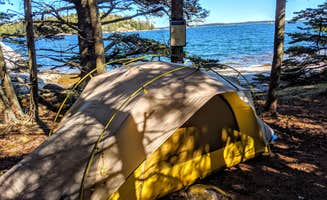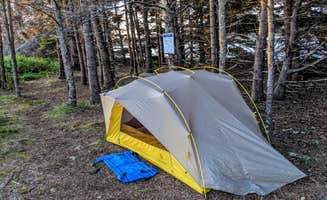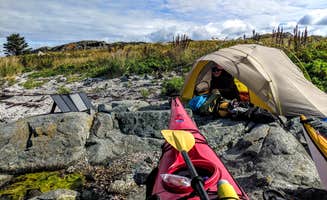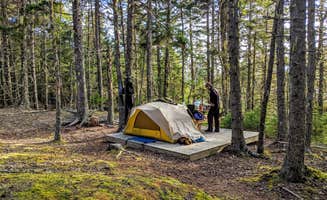Primitive camping near Northport, Maine occurs almost exclusively on the islands of the Deer Isle Archipelago. The region experiences typical northern New England coastal weather with heavy morning fog even in summer months and temperatures ranging from 65-80°F during peak camping season. Maine Island Trail Association (MITA) membership gives access to these remote camping spots which require significant planning due to tidal variations that can reach 10-12 feet between high and low tide.
What to do
Explore Isle au Haut: Wheat Island serves as a strategic basecamp for day trips to Isle au Haut, a remote section of Acadia National Park. "Perfect island for exploring the close-by Isle au Haut, a remote section of Acadia National Park, but very hard to get reservations at Duck Harbor Campground," notes camper Shari G. on Wheat Island.
Beach cleanup opportunities: Consider participating in conservation efforts during your island stay. As one reviewer mentions about Marshall Island, "if you do a beach clean-up during your stay and send in a picture, you will receive a Maine Coast Heritage Trust hat!" This allows visitors to contribute to preservation efforts while camping.
Shell collecting: Doliver Island provides unique shell collecting opportunities along its beaches. "Gorgeous shell covered beach and a beautiful view of Isle au Haut, just next door," according to one camper's experience, making this tiny island worth a stop despite its limited camping space.
What campers like
Easy access for beginners: For those new to sea kayak camping, some islands provide gentler entry points. According to reviews for Buckle Island, "This is a perfect island for those new to sea kayak camping as the sandy shore, which is exposed for a good portion of the day, is easy to land on and a short walk to a trail into the woods."
Multiple site options: Several islands offer more than one camping area, providing options based on group size. At Wheat Island, there are "2 sites– one very small one on the northeast side, the other perfect for larger groups on the southwest side."
Strategic paddling routes: The archipelago allows for multi-day paddling journeys. Doliver Island is described as "a good stop for us on our 9 day journey and a perfect launching spot for crossing Jericho Bay (4.5 miles) to Marshall Island the next day."
What you should know
Weather planning requirements: Wind and tide conditions affect both travel between islands and landing accessibility. Campers should note that some islands present particular challenges: "This can be a tricky island to land on at high tide, so plan accordingly," warns a review about Wheat Island.
Insect preparation: Mosquitoes remain persistent even when you might expect their season to be over. One camper at Wheat Island noted, "We thought we were passed mosquito season in early September, but alas, they were pretty bad at sunset."
Tent site limitations: Space constraints vary significantly between islands. Doliver Island has particularly limited space with "barely a tent space," according to reviews, while other islands offer more generous camping areas with established sites.
Tips for camping with families
Select beginner-friendly islands: Choose islands with accessible beaches for safer landings with children. Buckle Island features a "sandy shore, which is exposed for a good portion of the day, is easy to land on and a short walk to a trail into the woods."
Consider resupply options: For longer family trips, strategic planning should include potential resupply points. One camper notes that "If you happen to need a food or water resupply, Swan's Island is a short paddle away and has a very small grocery store and town office with fresh water."
Look for enhanced amenities: Some islands offer slightly more infrastructure than others. Marshall Island provides "a truly gorgeous wooded area with a tent platform and a picnic table at each site," making it more comfortable for families than completely primitive options.
Tips from RVers
Limited vehicle camping options: The primitive camping near Northport centers almost exclusively around boat-in island camping with no RV accommodations. All reviewed camping islands are designated as "NO big-rig-friendly" with no hookups or facilities for recreational vehicles.
Closest alternatives: RV campers should look toward mainland campgrounds in nearby towns rather than attempting to access these island sites, which are exclusively accessible by water craft and specifically designed for tent camping.





